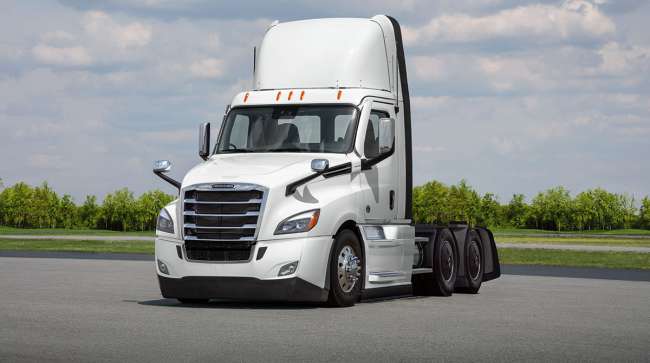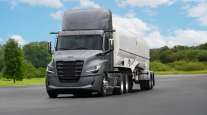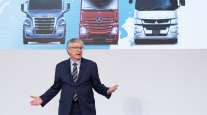Senior Reporter
Daimler Truck Reports Initial Quarterly Earnings as Independent Company

[Stay on top of transportation news: Get TTNews in your inbox.]
Daimler Truck Group, reporting for the first time as an independent company, saw fourth-quarter net income plunge and revenue tick up compared with the same 2020 period.
“We sold a lot fewer vehicles than we could have sold,” Martin Daum, chairman of Daimler Truck Holding AG, said during an online earnings presentation.
Total orders dropped 19% to 142,218 units as a tight supply chain remained in place.
CEO Martin Daum: "A profit of more than 3 billion euros - we can really be proud of the annual results we are presenting today. 2021 was challenging and we mastered the global supply chain shortages very well. Many thanks to the entire #DaimlerTruck team." pic.twitter.com/L8TYXWwn4P — Daimler Truck AG (@DaimlerTruck) March 24, 2022
“We have clear strategic priorities and ambitions to create additional value for our customers and for our investors,” he said. “Ambition No. 1 is to lead sustainable transportation. To that end, we are developing battery-electric as well as hydrogen-based vehicles, because we are certain our industry will need both technologies.”
Net income, reported in euros, for the period ended Dec. 31 was the equivalent of $198.8 million compared with $404.2 million in the 2020 quarter, the company said in its “condensed statement of income.”
Diluted earnings per share for what the company called its 2021 financial year were $3.13, and were stated without comparison. In 2020, the truck business was still within Daimler AG.
Revenue in the quarter was $12.4 billion compared with $11.8 billion a year earlier, according to the Germany-based company.
Daimler Truck began trading Dec. 10 as an independent company on the Frankfurt Stock Exchange under the stock symbol DTG, marking a new era following its spinoff from Daimler AG.
“[Higher] raw material prices have not yet been offset by the implemented price increases and a nonrecurring warranty issue in the United States had a negative impact,” Daimler Chief Financial Officer Jochen Goetz said during an online presentation.
In June, Daimler launched a voluntary safety recall of up to 122,056 Freightliner Cascadia and Western Star vehicles equipped with aluminum battery cables, which, if not sealed properly, could result in loss of electrical power and an unintended shutdown.
Inventory, stockpiled amid supply chain disruptions, in the quarter rose to $8.5 billion compared with $6.8 billion a year earlier.
Daimer Truck Holding Ag Ann... by Transport Topics
Meanwhile, the North America segment, the company’s largest and the market leader in the region, presented a mixed picture in the quarter,
Daimler’s Class 8 North American (U.S., Canada and Mexico) market share in the fourth quarter dipped to 39.8% compared with 40.7% in the same quarter 2020, the company reported, citing its own internal analysis.
Its North American Class 6 and Class 7 market share rose to 36.9% compared with 30% a year earlier.
Daimler’s total Classes 6-8 market share in North America increased to 38.9% compared with 37.3% in the 2020 period.
At the same time North American orders in the quarter plunged to 40,374 compared with 96,680 in the 2020 period.
The company reported its North American business unit in the fourth quarter notched unit sales of 47,626 compared with 42,058 a year earlier. That generated $5 billion in revenue, compared with $4.3 billion a year earlier.
Financial services revenue at the group in the quarter slid to $291.1 million compared with $316.3 million a year earlier.
Daum said the company intends to grow services “to translate customer relationships into recurring revenues and make us more resilient. It will help to make our business less cyclical and drive margins as well as return on capital employed. Of course, increasing our service revenue takes longer than reducing our costs, but we are on track here as well.”
Want more news? Listen to today's daily briefing above or go here for more info
Looking ahead, Daum said, “the company’s battery-powered vehicles are in series production, meaning we can produce thousands of them. The limiting factors are the infrastructure and the framework for cost parity with conventional vehicles.”
He said all three factors need to be in place so that its customers can make zero-emission vehicles, the backbone of their fleets.
“We as Daimler Truck are working closely with energy companies and policymakers. We all now need to join forces to move things forward.”
The company is one of the largest commercial vehicle manufacturers with a global reach, with more than 40 production facilities worldwide and more than 100,000 employees. Daimler Truck unites seven brands under its umbrella: BharatBenz, Freightliner, Fuso, Mercedes-Benz, Setra, Thomas Built Buses and Western Star.
Freightliner and Western Star are truck brands of Daimler Truck North America.




